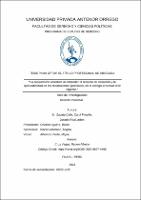| dc.contributor.advisor | Cruz Vegas, Ruben Alfredo | |
| dc.contributor.author | Zapata Calle, Carol Priscilla. | |
| dc.creator | Zapata Calle, Carol Priscilla. | |
| dc.date.accessioned | 2024-02-08T22:35:07Z | |
| dc.date.available | 2024-02-08T22:35:07Z | |
| dc.date.issued | 2024 | |
| dc.identifier.uri | https://hdl.handle.net/20.500.12759/20971 | |
| dc.description.abstract | La presente investigación buscó explorar en uno de los temas del
recurso de Casación; en tal sentido, se problematizó respecto al efecto
suspensivo con el cual se concede el recurso de Casación Civil en el
Perú.
De ahí que se halla propuesto como pregunta de investigación ¿De qué
manera la suspensión absoluta con la que se concede el recurso de
casación civil, regulada en el artículo 393 del código procesal civil
peruano; atenta contra la ejecutabilidad de las resoluciones judiciales?
La misma, que después de la respectiva recopilación y análisis de la
información adecuada, se pudo concluir que el actual trámite del
recurso de Casación Civil en el Perú hace entender que el efecto con
el cual se concede este recurso es siempre suspensivo, ello es fácil de
comprender a partir del artículo 392 del Código Procesal Civil, el mismo
que prescribe que la sola interposición de dicho recurso extraordinario
suspende los efectos de la resolución objeto de impugnación,
entendidas así las cosas, el efecto del concesorio de la Casación
impide directamente que se pueda ejecutar la resolución que es objeto
de este medio impugnatorio, ello implica que los justiciables que
quieran impedir la ejecución de una determinada resolución adversa
para ellos, encuentren en este recurso el terreno fértil para dilatar dicha
ejecutabilidad, lo que de todas maneras redundará en contra de la
economía, la celeridad procesal; y, de todas maneras contra la Tutela
Jurisdiccional Efectiva | es_PE |
| dc.description.abstract | The present investigation sought to explore one of the themes of the Cassation
appeal; In this sense, it was problematized regarding the suspensive effect
with which the Civil Cassation appeal is granted in Peru.
Hence, it is proposed as a research question: How the absolute suspension
with which the civil appeal is granted, regulated in article 393 of the Peruvian
civil procedure code; violates the enforceability of judicial decisions?
The same, that after the respective compilation and analysis of the appropriate
information, it was possible to conclude that the current process of the Civil
Cassation appeal in Peru makes it understand that the effect with which this
appeal is granted is always suspensive, this is easy to understand from article
392 of the Civil Procedure Code, the same one that prescribes that the mere
filing of said extraordinary resource suspends the effects of the resolution
object of challenge, understood in this way, the effect of the concession of
Cassation directly prevents it from being can execute the resolution that is the
subject of this challenge, this implies that the litigants who want to prevent the
execution of a certain resolution adverse to them, find in this resource fertile
ground to delay said enforceability, which in any case will redound against of
the economy, procedural speed; and, in any case, against the Effective
Jurisdictional Guardianship. | es_PE |
| dc.description.uri | Tesis | es_PE |
| dc.format | application/pdf | es_PE |
| dc.language.iso | spa | es_PE |
| dc.publisher | Universidad Privada Antenor Orrego | es_PE |
| dc.relation.ispartofseries | T_DEREP_042 | |
| dc.rights | info:eu-repo/semantics/openAccess | es_PE |
| dc.rights.uri | https://creativecommons.org/licenses/by/4.0/ | es_PE |
| dc.source | Universidad Privada Antenor Orrego | es_PE |
| dc.source | Repositorio Institucional - UPAO | es_PE |
| dc.subject | Casación | es_PE |
| dc.subject | Suspensividad | es_PE |
| dc.title | La suspensión absoluta al conceder el recurso de casación y la ejecutabilidad de las resoluciones judiciales, en el código procesal civil vigente. | es_PE |
| dc.type | info:eu-repo/semantics/bachelorThesis | es_PE |
| thesis.degree.level | Título Profesional | es_PE |
| thesis.degree.grantor | Universidad Privada Antenor Orrego. Facultad de Derecho y Ciencias Politicas | es_PE |
| thesis.degree.name | Abogada | es_PE |
| thesis.degree.discipline | Derecho | es_PE |
| dc.subject.ocde | https://purl.org/pe-repo/ocde/ford#5.05.00 | es_PE |
| renati.advisor.orcid | https://orcid.org/0000-0002-8697-4468 | es_PE |
| renati.author.dni | 73831303 | |
| renati.advisor.dni | 42664438 | |
| renati.type | https://purl.org/pe-repo/renati/type#tesis | es_PE |
| renati.level | https://purl.org/pe-repo/renati/level#tituloProfesional | es_PE |
| renati.discipline | 421016 | es_PE |
| renati.juror | Ortecho Aguirre, Rocio | |
| renati.juror | Rincón Martinez, Angela | |
| renati.juror | Albornoz Verde, Miguel | |
| dc.publisher.country | PE | es_PE |




